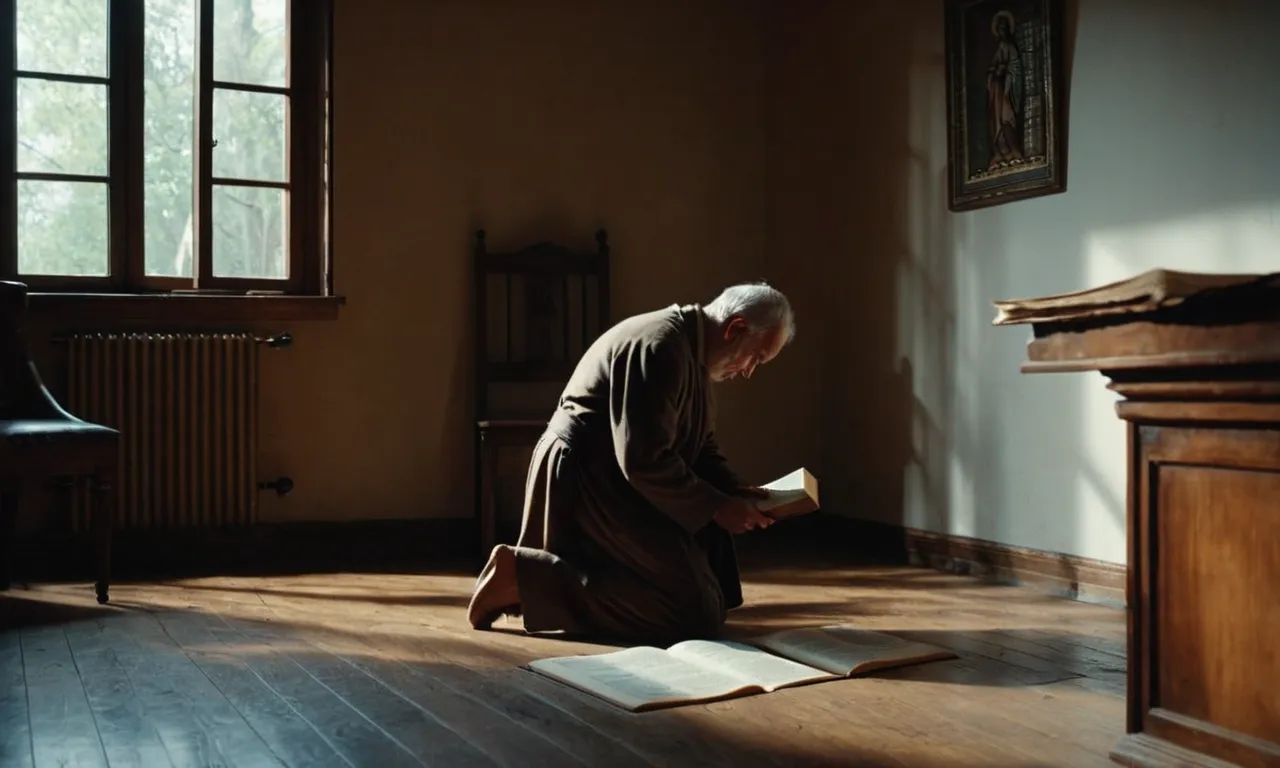Who Killed Their Son In The Bible?
The horrific story of a son being killed by his own parent appears more than once in the pages of Scripture. If you’re looking for a quick answer, one of the most well-known instances involves the testing of Abraham’s faith when God commands him to sacrifice his son Isaac in Genesis 22.
However, there are other examples of fathers killing sons in the Bible that we will explore in this article.
We will provide a comprehensive, detailed look at the different instances where a biblical figure is killed by one or both parents, examining the context, characters, and aftermath of these tragic tales.
By the end, you’ll have a thorough understanding of the pertinent passages and characters involved when sons lost their lives at the hands of their fathers or parents in the Bible.
The Binding and Near-Sacrifice of Isaac by Abraham
God’s Command to Abraham
The story of the binding of Isaac is found in Genesis 22. God commands Abraham to take his only son Isaac to the land of Moriah and offer him as a burnt offering. This was a test of Abraham’s faith and obedience to God. Though Abraham loved his son dearly, he obeyed God’s difficult command.
Early the next morning, Abraham gathered supplies and set off with Isaac and two servants. After three days of traveling, they arrived at Mount Moriah where Abraham was to carry out the sacrifice.
Abraham’s Obedience and Isaac’s Submission
When they reached the mountain, Abraham instructed his servants to wait with the donkey while he and Isaac went to worship. Abraham took the wood for the burnt offering and placed it on Isaac, while he carried the fire and knife.
As they walked, Isaac noticed they had wood and fire but no animal for sacrifice. He asked his father about this, and Abraham responded that God would provide the sacrifice. What amazing obedience and trust in God’s provision!
When they arrived at the place God had designated, Abraham built an altar and arranged the wood on top. He then bound his beloved son Isaac and laid him on the altar. As Abraham raised the knife to slay his son, an angel of the Lord stopped him, saying “Do not lay a hand on the boy.”
Abraham had passed the test, demonstrating his faith and obedience to God. He then sacrificed a ram that was caught in a thicket nearby, provided by God.
Divine Provision of a Sacrificial Ram
This story illustrates how God provided a sacrifice to take the place of Isaac. Some see this as foreshadowing God’s provision of Christ as an atoning sacrifice for sin. Just as the ram was substituted for Isaac, Jesus would be the ultimate substitutionary sacrifice centuries later on the cross.
Abraham named the place “The Lord Will Provide” as a memorial to God’s provision. God then reaffirmed his covenant promises to Abraham because of his faithfulness.
This dramatic event shaped the identity of ancient Israel. It showed that God did not require human sacrifice like other ancient Near East religions. It also demonstrated Abraham’s supreme trust and obedience to God. Today, Abraham remains as our exemplar of faith.
Like Abraham, we are called to trust God completely and surrender everything to Him.
The Killing of Absalom by David’s Army Commander
Context of Absalom’s Rebellion and David’s Exile
After David’s son Absalom rebelled and tried to seize the throne, David was forced into exile from Jerusalem. Absalom had won the support of many Israelites due to his charisma and good looks (2 Samuel 15). However, David still had loyal supporters, including his mighty army commanded by Joab.
David fled Jerusalem but vowed to return and regain his kingdom.
The Battle in the Forest of Ephraim
The forces of David and Absalom eventually met in battle in the Forest of Ephraim (2 Samuel 18:6-8). David had ordered his men to be gentle with Absalom, perhaps hoping for a peaceful resolution. But as the battle raged in the thick woods, Absalom got caught by his long hair in the branches of an oak tree.
Left defenselessly hanging there, Joab took the opportunity to kill the rebel prince by thrusting three spears into his heart (2 Samuel 18:14).
Joab’s Execution of Absalom
Joab and his armor bearers struck down Absalom and buried him in a large pit, heaping stones over his body (2 Samuel 18:15-17). When David heard the news that Absalom had been killed, he was overcome with grief, weeping and mourning: “O my son Absalom! My son, my son Absalom!
If only I had died instead of you!” (2 Samuel 18:33). Joab rebuked David for caring more about the death of a rebel than for the men who had saved his kingdom (2 Samuel 19:5-7).
So while David wished to show mercy to his beloved yet rebel son, Joab carried out the execution that he felt was necessary to secure David’s hold on the kingdom. This tragic story illustrates the heartbreak that can result when family members are on opposite sides of power struggles.
The Execution of Adonijah by Solomon’s Orders
Adonijah’s Bid for the Throne
After King David became old and bedridden, his son Adonijah saw an opportunity to seize the throne. He conspired with Joab the commander of David’s army and Abiathar the priest, gaining their support for his claim (1 Kings 1:5-7).
Adonijah held a feast where he declared himself king, but he did not have the backing of David, the prophet Nathan, Bathsheba or Solomon (1 Kings 1:8-10). When Nathan caught wind of Adonijah’s self-appointment, he quickly advised Bathsheba to remind David of his oath that Solomon would succeed him as king (1 Kings 1:11-14).
Solomon’s Promise of Clemency
After David ordered Solomon to be anointed as the next king, Adonijah feared retribution for his attempted coup. He fled to grasp the horns of the altar seeking sanctuary. Solomon permitted Adonijah to live freely so long as he proved himself a worthy man, stating “If he shows himself to be worthy, not a hair of his head will fall to the ground.
“ This demonstrated Solomon’s initial mercy and desire to establish his reign peacefully (1 Kings 1:50-53).
Adonijah’s Appeal to Bathsheba
Some time later, Adonijah approached Bathsheba asking her to request permission from King Solomon for him to marry Abishag. Abishag had been appointed to care for the aging King David, which could imply Adonijah still had ambition for inheriting the throne (1 Kings 2:13-17).
Bathsheba presented his appeal to Solomon, not realizing the implications.
Solomon’s Order for Adonijah’s Death
Solomon immediately saw through Adonijah’s latest grasp for power and ordered his execution. With Joab having turned against him and Abiathar banished, Solomon decisively consolidated control by removing the final threat.
His quick response against Adonijah demonstrated that while Solomon desired peace, he would not tolerate direct challenges to his God-ordained kingship.
Conclusion
The heartbreaking accounts of Abraham and Isaac, Absalom and David, and Adonijah and Solomon remind us of the deadly consequences of disobedience toward God. However, they also display God’s mercy in providing an alternate sacrifice for Abraham and allowing David’s lineage to continue through Solomon.
While disturbing, these stories of fathers and sons highlight key themes of the Bible: mankind’s continued sin and failures set against God’s ultimate faithfulness toward His people. They showcase how God works even through human brokenness and violence to bring about His sovereign plans.








